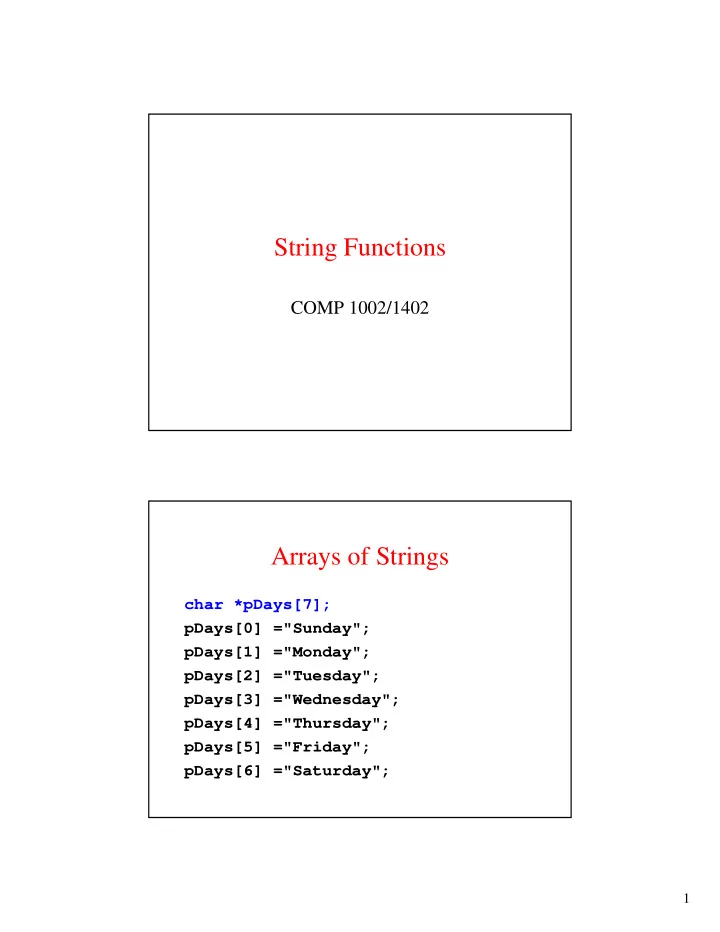

String Functions COMP 1002/1402 Arrays of Strings char *pDays[7]; pDays[0] ="Sunday"; pDays[1] ="Monday"; pDays[2] ="Tuesday"; pDays[3] ="Wednesday"; pDays[4] ="Thursday"; pDays[5] ="Friday"; pDays[6] ="Saturday"; 1
Pointers to Strings Walking thro’ Array char **pWalker, **pLast ; pLast = &pDays[6] For (pWalker = pDays; pWalker <= pLast; pWalker++;) {Body of the Loop} printf("%p -> %s\n", pWalker, *pWalker) 2
Functions : gets and fgets char *gets (char *strPtr); /*stdin */ char *fgets (char *strPtr, int size, FILE *fp);/* from file */ Fetches input string till '\n' • If there is a problem it returns NULL • Otherwise it returns the pointer • gets Changes '\n' to '\0’; Not fgets Functions gets and fgets 3
Functions puts and fputs int puts (const char *strPtr); /*to stdout */ • puts Changes '\0' to newline int fputs ( const char *strPtr, FILE *fp ); /* outputs to file */ • fputs does not change '\0' to newline • '\0' is dropped • Outputs string may or may not have newline • If there is a problem both return EOF Functions : puts and fputs 4
String Manipulation Functions C has a variety of string functions • Included in <string.h> • All begin with str Function : strlen (length) Outputs : String Length (not including '\0' ) int strlen(const char *s); How to Use: char *pstr="Hello"; int i = strlen(pstr); 5
Function : strlen (length) char strng[81]; … fputs(strng, outFile); if (strng[strlen(strng) – 1] != '\n'){ fputs("\n", outFile); } /* If the last character in a “line” is not newline it inserts one….*/ String Copy (returns to ) char *strcpy(char *to, const char *from); strcpy – Not safe, length not specified char *strncpy(char *to, const char *from, int size); strncpy – Safer because length is specified 6
s t r c p y s t r n c p y 7
String Compare int strcmp(const char *str1,const char*str2); strcmp – Length not specified int strncmp(const char *str1,const char *str2, int size); strncmp – Compare up to specified length s t r c m p 8
strncmp(str1,str2,size) str1 str2 Size Results Returns "ABC123" "ABC123" 8 equal 0 "ABC123" "ABC456" 3 equal 0 "ABC123" "ABC456" 4 str1 < str2 <0 "ABC123" "ABC" 3 equal 0 "ABC123" "ABC" 4 str1 < str2 >0 "ABC" "ABC123" 3 equal 0 String Concatenate (returns to ) char *strcat(char *to, const char *from); strcat – Not safe, length not specified char *strncpy(char *to, const char *from, int size); strncat – Safer because length is specified 9
strcat & strncat Character in String char *strchr(const char *string, char ch) strchr – returns pointer to first match char *strrchr(const char *string, char ch) strrchr – returns pointer to last match 10
strchr & strrchr String in String char *strstr(const char *strng, const char *sub_str) strstr – returns pointer to first match 11
String Token char *strtok(const char *strng, const char *delim) strtok – returns pointer to first match after first delimiter If strng is NULL then returns next pointer NB. In the next slide the top string is wrong. There should only be a space between SUM and =, and no the null character, ‘\0’. s t r t o k 12
Scan Memory String int sscanf(char *str, const char *format,…); “Reads” memory into variables Uses format string of scanf... Returns number of variables read sscanf Allows more control over data from file 13
Example : sscanf Input: Einstein, Albert; 1234 67 D Code: i = sscanf(strIn, "%25[^;]%*c%4s%d%*[^ABCDF]%c", name, stuNo, &score, &grade); Format Memory String int sprintf(char *str, const char *format,…); “prints” variables into memory Uses format string of printf... Returns EOF if error occurs 14
sprintf Allows ease of use and control 15
Recommend
More recommend